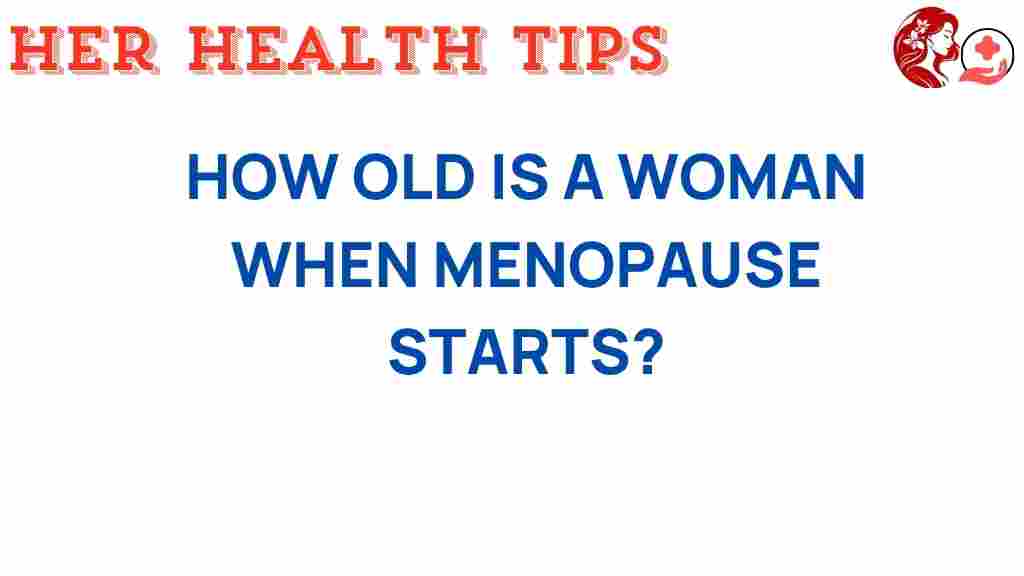The Age of Change: Unveiling When Menopause Begins
Menopause is a significant phase in a woman’s life, marking the end of her reproductive years. Understanding the age of onset and the hormonal changes that accompany this natural life transition is crucial for women’s health. This article delves into menopause, exploring its symptoms, the impact on reproductive health, and how women can navigate this midlife stage with awareness and confidence.
Understanding Menopause
Menopause is defined as the time in a woman’s life when her menstrual periods cease for 12 consecutive months, indicating the end of ovarian function. Typically occurring between the ages of 45 and 55, menopause signifies a major shift in hormonal balance and requires a proactive approach to women’s health.
Key Phases of Menopause
- Perimenopause: This transitional phase can begin several years before menopause, usually in a woman’s 40s. During perimenopause, hormone levels fluctuate, leading to various symptoms.
- Menopause: The official stage where menstrual periods stop. The average age of onset is around 51.
- Postmenopause: This phase begins after menopause has been confirmed. Women may experience ongoing symptoms but also gain new health considerations.
The Age of Onset
The age of onset for menopause varies widely among women. While most experience menopause between 45 and 55, some may enter this phase earlier or later due to various factors, including genetics, health conditions, and lifestyle choices. Understanding the average age can help women prepare for and manage this transition.
Hormonal Changes During Menopause
During menopause, significant hormonal changes occur, primarily a decrease in estrogen and progesterone production. These hormonal shifts lead to various symptoms and changes in women’s health, including:
- Hot flashes and night sweats
- Irregular or missed periods
- Vaginal dryness
- Sleep disturbances
- Mood swings and anxiety
- Changes in libido
Symptoms of Menopause
The symptoms of menopause can vary greatly among women. Some may experience mild discomfort, while others face more severe challenges. Here are some common symptoms associated with this life transition:
- Hot Flashes: Sudden feelings of warmth, often accompanied by sweating and discomfort.
- Night Sweats: Hot flashes that occur during sleep, disrupting rest.
- Irregular Periods: Changes in menstrual cycle length and flow.
- Vaginal Dryness: Reduced estrogen levels can lead to dryness and discomfort during intercourse.
- Emotional Changes: Mood swings, anxiety, and even depression may arise.
- Memory Problems: Cognitive changes, often referred to as “brain fog.”
Managing Symptoms of Menopause
While menopause is a natural process, managing its symptoms is essential for maintaining quality of life. Here are some strategies to consider:
1. Lifestyle Changes
Adopting a healthier lifestyle can significantly ease menopause symptoms:
- Regular Exercise: Engaging in physical activity helps manage weight, improves mood, and reduces hot flashes.
- Healthy Diet: A balanced diet rich in fruits, vegetables, whole grains, and lean proteins can support overall health.
- Avoiding Triggers: Identifying and avoiding foods or situations that trigger hot flashes can be beneficial.
2. Hormone Replacement Therapy (HRT)
For some women, HRT may be an effective option to alleviate severe symptoms. HRT involves taking medications that contain female hormones to replace the ones the body no longer makes after menopause. It’s essential to discuss the potential benefits and risks with a healthcare provider.
3. Alternative Therapies
Many women find relief through alternative therapies, including:
- Herbal Supplements: Some herbs, like black cohosh and red clover, are believed to help with menopausal symptoms.
- Acupuncture: This traditional Chinese medicine practice may alleviate hot flashes.
- Meditation and Yoga: These practices can reduce stress and improve overall well-being.
Health Awareness During Menopause
Increased health awareness is vital during menopause. Women should prioritize regular check-ups and screenings, including:
- Mammograms: Recommended every one to two years for breast health.
- Pap Smears: To monitor cervical health as recommended by a healthcare provider.
- Bone Density Tests: To assess the risk of osteoporosis, which increases after menopause.
Additionally, maintaining open communication with healthcare providers about any symptoms or concerns is crucial for navigating this transition effectively.
Common Misconceptions About Menopause
Many misconceptions surround menopause, which can lead to unnecessary anxiety. Here are some common myths debunked:
- Myth: Menopause happens suddenly. Fact: It is a gradual process that unfolds over several years.
- Myth: Menopause means the end of sexual activity.Fact: Many women continue to have fulfilling sexual lives with proper management of symptoms.
- Myth: All women experience severe symptoms. Fact: Symptoms can vary widely, and not all women face significant challenges.
Conclusion: Embracing the Transition
Menopause is a natural life transition that every woman will experience, and understanding when it begins and what to expect can empower women to manage their health effectively. By staying informed about the age of onset, hormonal changes, and symptoms, women can navigate this phase with confidence and ease.
With the right knowledge and support, the age of change can become a time of renewal and personal growth. Women should embrace this transition, prioritize their health, and seek guidance when needed. For more information on women’s health and menopause, consider visiting this resource for expert insights.
Remember, menopause is not the end but a new beginning, and with increased health awareness, women can thrive in their midlife and beyond.
This article is in the category Reproductive and created by HerHealthTips Team
